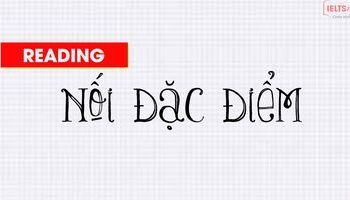Giới thiệu Tết bằng tiếng Anh như thế nào cho ấn tượng? Cùng tham khảo các cách triển khai về chủ đề Tết dưới đây với từ vựng và bài mẫu Speaking cùng IELTS Fighter nha.
PDF sẽ được cập nhật bên dưới nhé.
Vocabulary - Tet holiday
Để nói về ngày Tết thì các bạn cũng có thể tự soạn bài nói cho mình với những hướng triển khai khác nhau. Một số từ vựng bổ sung về ngày Tết có thể dùng cho Speaking hoặc chia sẻ giới thiệu cho người khác về ngày Tết bằng tiếng Anh dưới đây nhé.
Từ vựng tiếng Anh về Tết
| Từ vựng | Phiên âm | Loại từ | Nghĩa |
| traditions and rituals | /trəˈdɪʃnz ənd ˈrɪtʃuəlz/ | (n) | phong tục tập quán |
| adopt | /əˈdɒpt/ | (v) | du nhập |
| sticky rice cake | /stɪki ˈraɪs keɪk/ | (n) | bánh nếp |
| savory | /ˈseɪvəri/ | (adj) | mặn |
| principle | /ˈprɪnsəpl/ | (n) | quy tắc |
| filling | /ˈfɪlɪŋ/ | (n) | nhân |
| ground | /ɡraʊnd/ | (v) | xay |
| press | /pres/ | (v) | ép |
| seasonings | /ˈsiːzənɪŋz/ | (n) | gia vị |
| custom | /ˈkʌstəm/ | (n) | phong tục |
| mark | /mɑːk/ | (v) | đánh dấu |
| concise | /kənˈsaɪs/ | (adj) | ngắn gọn |
| Year of Rooster | /jɪə(r) əv ˈruːstə(r)/ | (n) | năm Dậu |
| abstain from | /əbˈsteɪn frəm/ | (v) | tránh, kiêng |
| refrain from | /rɪˈfreɪn frəm/ | (v) | hạn chế |
| kumquat tree | /ˈkʌmkwɒt triː/ | (n) | cây quất |
| peach blossom | /piːtʃ ˈblɒsəm/ | (n) | cây đào |
| apricot blossom | /ˈeɪprɪkɒt ˈblɒsəm/ | (n) | cây mai |
| greeting | /ˈɡriːtɪŋ/ | (n) | lời chào |
| essentially | /ɪˈsenʃəli/ | (adv) | về cơ bản, thực chất |
| challenging | /ˈtʃælɪndʒɪŋ/ | (adj) | khó, thử thách |
| accurate | /ˈækjərət/ | (adj) | chính xác, đúng đắn |
| get rid of | /ɡet rɪd əv/ | (phr.v) | loại bỏ, bỏ |
| security and prosperity | /sɪˈkjʊərəti ənd prɒˈsperəti/ | (n) | an khang thịnh vượng |
| longevity | /lɒnˈdʒevəti/ | (n) | tuổi thọ cao |
Từ vựng món ăn ngày Tết
| Từ vựng | Phiên âm | Loại từ | Nghĩa |
| Red Vietnamese Melon Sticky Rice | /red ˌviːetnəˈmiːz ˈmelən ˈstɪki raɪs/ | (n) | Xôi gấc (Gấc nằm trong họ “melon”) |
| Deep-fry Spring Roll | /ˌdiːp ˈfraɪ ˌsprɪŋ ˈrəʊl/ | (n) | Chả nem rán |
| Vietnamese Meatball | /ˌviːetnəˈmiːz ˈmiːtbɔːl/ | (n) | Mọc |
| Chinese Noodle | /ˌtʃaɪˈniːzˈnuːdl/ | (n) | Bún tàu/ Miến (Trung Quốc không phân biệt miến - bún - phở) |
| Vietnamese Fermented Noodle | /ˌviːetnəˈmiːz fəˈmentɪd ˈnuːdl/ | (n) | Bún |
| Steamed white-cut Chicken | /stiːmd waɪt kʌtˈtʃɪkɪn/ | (n) | Gà luộc cắt miếng |
| Bamboo Shoot | /ˌbæmˈbuː ʃuːt/ | (n) | Măng |
| Pig’s trotter | /pɪɡˈtrɒtə(r)/ | (n) | Chân giò |
| Pickled Shallot | /ˈpɪkld ʃəˈlɒt/ | (n) | Hành muối |
| Caishen | (n) | Thần Tài | |
| Incense | /ˈɪnsens/ | (n) | Hương |
Bài mẫu giới thiệu ngày Tết bằng tiếng Anh hai miền:
For hundreds of years, Tet has been a traditional festival and ritual ceremony across Vietnam. Its importance in spiritual life as a break-off period was honored by ordinary people and royal dynasties. When Vietnam came into the new world, many things happen to change, yet Tet stays as it has been for generations, with a few modern twists.
From every street, every house, and every window, any foreigner could spot that this biggest holiday is coming so close. Businesses and schools start to close down between the 23rd and 27th of December (Lunar Calendar), for students and employees to pack up and head home. Red lanterns and Tet-style LEDs are hung up everywhere; commercial advertisements now only field Tet-vibe. In some public spots or large areas, kumquat trees, peach blossoms, or apricot blossoms are planted and decorated.
Yet, Vietnamese businesses don’t basically stop. Our individual household businesses start weeks before Tet. Tet Fiona markets are open in every municipality of Vietnam, from small villages to crowded cities, with thousands of “Tet” trees.
Though both the Southern and Northern regions have many common things, Vietnamese people still easily tell them apart. Northern Tet’s traditional dishes focus on its complexity in detail, layers, and taste; while Southern Tet’s traditional dishes focus on its simplicity, folklore-kind in the table. However, we still have the same dishes like steamed white-cut chicken, deep-fried spring rolls, or sticky rice. In the North, people would have Banh Chung (a square-like cake that is stuffed with meat, beans, and sticky rice, covered in “dong” or banana leaf and steamed) and sticky rice cake as offerings to ancestors; while the Southern people would choose Banh Tet (a similar cake to Banh Chung but is longer) as offerings.
Yet, no matter where you are, Vietnamese people always reach for the unity of the family, on the, maybe, most sacred holiday. Many people who are workers, students, or even Vietnamese overseas, try to come back home for a reunion.
Hope you guys have a beautiful Tet holiday!
IELTS Speaking - Tet Holiday
Speaking Part 2
Các đề bài hay gặp về chủ đề ngày lễ hội như Describe your favourite holiday, What is the most important festival in your country hay An important holiday hoặc Describe an interesting tradition in your country thì các bạn cũng đều có thể nói về ngày Tết nha.
Chuỗi livestream về chủ đề Tết được thực hiện trong group IELTS Fighter - Hỗ trợ học tập, phân tích rõ ở đây với giáo viên chuyên môn đây nhé: https://www.facebook.com/groups/548675179456397/
Bản pdf tài liệu chuỗi live: TẠI ĐÂY
Chúng ta có các bài mẫu và từ vựng hay chủ đề Tet Holiday mà các bạn có thể tham khảo dưới đây nhé.
What is the most important festival in your country?
The extremely important event to all Vietnamese families must be The Vietnamese New Year or Tet.
One of the most indispensable festivals in my country as well as other Asian countries is Tet, or we call it Lunar New Year Festival. It has significant meaning as it’s the moment when the old year is over and the new year is celebrated.
The fireworks start on New Year's Eve and many Vietnamese people, especially the younger generations tend to flock to some popular locations like Nguyen Hue Walking Street to watch these and celebrate the beginning of a brand-new year.
According to tradition, first-footing on New Year's Eve is deemed crucial as this can influence the new year's fortune. Vietnamese people often wish each other peace, health, luck and prosperity for the upcoming year. It’s the quality time to spend with our nearest and dearest that makes Tet so special and unique.
It’s more like a time for reunions, a moment to reflect what's happened and prepare for the fresh start , and most importantly, an occasion to enjoy ourselves, recharge our batteries as well as cherish the most valuable things in life.
Từ vựng hay:
Indispensable /ɪndɪˈspensəbl/: Không thể thiếu
Has significant meaning /həz sɪɡˈnɪfɪkənt ˈmiːnɪŋ/: Có ý nghĩa đặc biệt
Flock to /flɒk tə/: Đổ xô tới
First-footing /ˌfɜːst ˈfʊtɪŋ/: Xông đất
Fortune/ˈfɔːtʃuːn/: Của cải
Prosperity/prɒˈsperəti/: Sự giàu cỏ
Recharge our batteries /ˌriːˈtʃɑːdʒ ɑː(r) ˈbætri/: Hồi phục lại năng lượng
Quality time/ˈkwɒləti taɪm/: Thời gian quý báu
Cherish/ˈtʃerɪʃ/: Trân trọng.
Describe an interesting tradition in your country.
Vietnam is well-known for having rich traditions so there are a number of interesting practices that I can think of off the top of my head. There’s one in particular that I think is really intriguing and strange at the same time which is ‘’burning fake money’’ tradition and I can’t wait to share with you in details.
From my knowledge, the custom of burning fake money is deeply rooted in East Asian culture, especially in China and Vietnam for thousands of years. It often occurs on the 1st and 15th of every month based on the lunar calendar. These rituals are also performed on the death anniversaries and funerals of loved ones throughout the years and it is especially grand during the Tet holiday.
Asians in general and especially Vietnamese follow this tradition in a very serious way. We believe this is an essential way to show respect to the dead and wishing our ancestors to start their new year with plenty of money in their spiritual bank.
Alongside fake money, Vietnamese people also burn away various types of paper models like multi-storey houses, motorbikes, servants and and other valuable items.
All in all, this practice has become an important part of our culture and I’m sure it won’t die away easily. With that being said, I think we should treat our close family wholeheartedly when they’re still alive rather than burning fake things to them once they’ve passed away.
Từ vựng nổi bật:
Burn fake money /bɜːn feɪk ˈmʌni/: Hóa vàng
On the top of one’s head: Bật nhớ trong đầu
Intriguing /ɪnˈtriːɡɪŋ/: Thú vị
Deeply rooted /ˈdiːpli ˈruːtɪd/: Bắt nguồn từ
Ritual/ˈrɪtʃuəl/: Nghi lễ, nghi thức
Death anniversary /deθ ˌænɪˈvɜːsəri/: Ngày giỗ
An essential way of showing respect: Cách để bày tỏ lòng kính trọng
The dead: Người đã mất
Paper model /ˌpeɪpə ˈmɒdl/: Đồ vàng mã
Wholeheartedly/ˌhəʊlˈhɑːtɪdli/: Bằng cả tấm lòng
Bên cạnh đó còn 3 bài mẫu theo kiểu đề Describe an important holiday that is celebrated in your country mà bạn có thể tham khảo qua link này nhé: An important holiday
Speaking part 3
Trên đây là từ vựng hay kèm với bài mẫu Speaking part 2-3 giới thiệu ngày Tết bằng tiếng Anh, các bạn cùng tham khảo để nâng cao vốn từ, cách trả lời ghi điểm nhé!
Bài mẫu do đội ngũ học thuật IELTS Fighter thực hiện, vui lòng ghi nguồn khi chia sẻ nhé!





